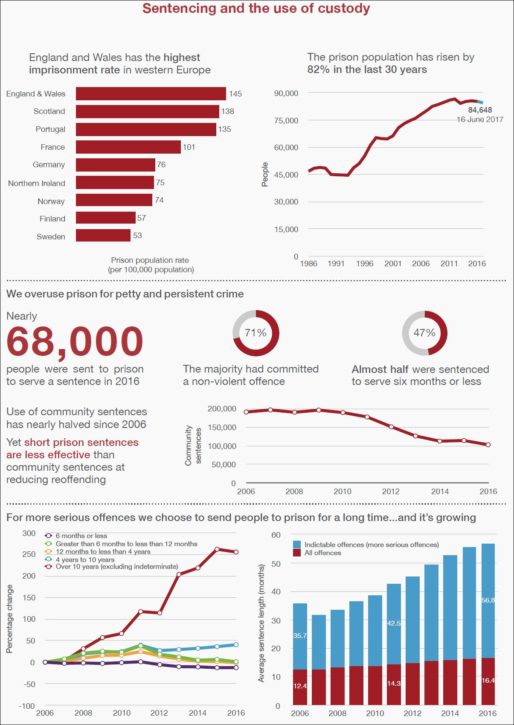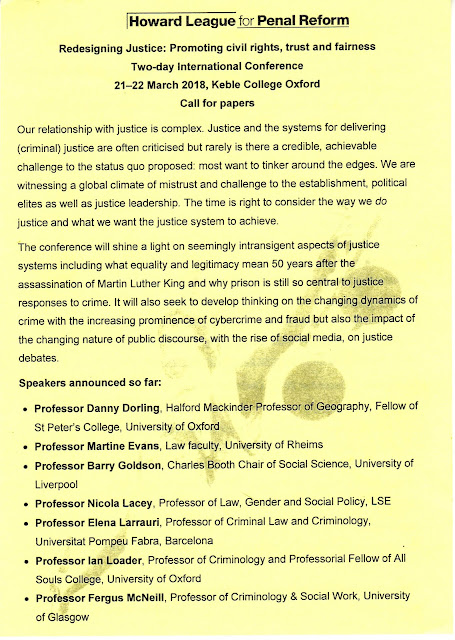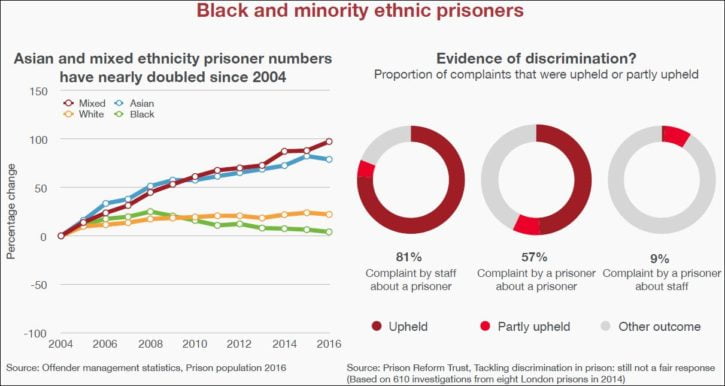The
Howard League for Penal Reform launches 3 Rs Campaign.
Overcrowded
Prisons are rivers of Crime. We are
throwing more and more individuals into these rivers raging rivers of Violence,
Drugs, Frustration and Mental Distress, and somehow thinking that this will
make them better people. It does not,
the river sweeps them away into deeper currents and further into crime.
The
state of Prisons is now a National emergency and this is why Howard League has
launched a campaign, advising Ministers to address the 3 Rs: Rules, Release and
Recall.
RULES
IN PRISON
Stead
of solving problems, imposing additional days of imprisonment for the breaking
of Prison Rules feeds a vicious cycle. It
increases pressure on the Prison population and worsens overcrowding, which in
turn further enforces the conditions for Drugs Abuse and Violence. At the same time, Prisons have made Rules to Incentives
Prisoner’s behaviours more punitive, which is also contributing to the
poisonous atmosphere behind bars.
Solution
should include making the imposition of additional days an indicator of a
poorly performing Prison, suspending the imposition of additional days
conditional on good behaviours, or removing the option of additional days
entirely. The rules around Incentives
and Earned Privileges must be revised.
RELEASE
FROM PRISON
Prisoners
need more opportunity to earn their return to the Community through Temporary Release
and Parole. Use of Temporary Release has
fallen by a third since 2013. This means
that Prisoners cannot demonstrate that they are ready to be released, and it
leads to longer sentences. The Parole Board
ought to be resourced adequately, and Ministers should adopt a recommendation
made by its Chair, Professor Nick Hardwick that the test for release should
change.
This
would involve the Prison Services having to demonstrate a risk, rather than a Prisoner
demonstrating that they do not.
RECALL
TO PRISON
The
number of people in Prison due to Recall has increased by 4,3000 per
cent in the last 20 years.
Sending
someone back to the Prison for a technical breach of their licence conditions
is unjustified. Breaches should be dealt
with in the Community. Recalled for
technical breaches of their licence, often for failing to attend appointments.
An
Inquiry those trying to step in and support Prisoners who were being let down
by inadequate through the Gate Services as they were released from Prison. Many homeless or in unstable Temporary Accommodation
for a few nights and staff were ill equipped to resolve this. A report calls on the Government to Act
immediately and create a sustainable Model.
Solution
Frances
Cook urged Ministers to save lives by taking steps to reduce the Prison
Population.
- It is
official that more people died in Prison in 2016 than in any other year on
record, and more Prisoners by suicide than ever before.
- No one
should be desperate while in the Care of the State that they take their
own life, and yet every 3 days a family is told that a loved one has died
behind bars.
- Cutting
staff and Prison budgets while allowing the numbers of people behind bars
to grow unchecked has created a toxic mix of violence, death and human
misery.
- The
problems are clear for all to see. By
taking bold but sensible action to reduce the number of people in Prison,
we can save lives and prevent more people being swept away into deeper
currents of crime and disrepair.
I’m
hatching 6 duck eggs in my room at the moment
A
man 43 from Liverpool Breakfast pack are tiny not enough to feed a child, let
alone fully grown men who will do a full days labour for pennies. I go back to work still hungry, listening to
the all the lads talk of this morning’s violence, deaths, riots, cell smashes,
and roof top demonstrations. Same old
but I try to keep positive and help as many lads I can. I look around me see to see the sick,
disabled, unwell the old, those who should be in hospital, not in Prison. How is this getting me ready for release or
protecting the public?
A
man 36, Channings Wood
I
walk some more around the football field for 3 quarters of an hour. Sit down on a bench and look across the field.
Not long now when I hope to get
released. Shower and clean teeth and
into bed to watch TV. Asleep by 21:40ish
and that is it for another groundhog day. How is this getting me ready for
release or protecting the public? Waste of time and money. Tomorrow will be the
same.
Aman,49
North sea Camp
The
bed is solid, flat wooden board. My body
weight has slowly crushed it into a misshapen double dipped torture device…Was
woken briefly by powerful LED torch in my face to make sure I wasn’t dead. Sometimes I wish I was.
Aman
62, High Down
When
will the Government get it right? It’s become a dumping ground, a human
warehouse where no one hears the screams of those in misery shut off from the
world. Never knowing what’s happening
day to day locked in a cell all day is a current event. Before I escape this nightmare through my
dreams, I will awake for a while until I can reconcile the madness of the place
and somehow console myself for all the things that I didn’t get here today-
like every night.
Katherine
Gleeson
Recalled
Prisoners are force to make choices between friendship or isolation. You can find yourself in isolation on Release.
Left in a City or Town with poor Community
Support / network away from friends and family.
Only
to find you’re being recalled not for committing a crime but for not disclosing
a relationship though disclosing a relationship could potentially end your
relationship a decision no one should be forced to make, or forced to toile
over telling Probation or not. Informing Probation they would want to know
that Person’s Name and Address giving away your past. The past one wants to move away from.
Recalled
for "not being consistent at keeping to appointments. A difficult task for those with Dyslexia,
Dyspraxia, Asperger’s – other….Repetition task and Short term memory is just a
snap shot. Those with hidden
disabilities need special measures, not recall. Probation have little knowledge or
understanding of complex impairments or Mental Health which can often disable
or debilitate a person. A snap shot of
recalled without committing an offence.
The
state of our Prison System
The
Prison Reform Trust has just recently on the 19th June 2017
published its most recent “Bromley Briefing” an up-to-date compendium of
facts that give an accurate, if depressing account of the state of our Prison System.
1: Our
Prison Population risen by 82% in the last 32 years. Even though crime rates are down and,
according to the National Audit Office, there is no consistent correlation
between Prison numbers and levels of crime. International comparisons also show there is
no consistent link between the two.

2: 6,554
are currently in Prison because they were Recalled. The Recall Population has increased by nearly
1,000 people since the Offender Rehabilitation Act came into force on 1 February 2015. Nearly 8,000 people serving a sentence of less
than 12 months were recalled back to custody in the year to December 2016.
3: Overcrowding
remains as bad as ever. At the end of
May 2017, 76 of the 117 Prisons in England and Wales were
overcrowded—holding 9,496 people more than they were designed to. 20,995 people were held in overcrowded
accommodation on average in 2015–16—nearly a quarter of the Prison Population. The majority were doubling up in cells
designed for one. This level of
overcrowding has remained broadly unchanged for the last 12 years.
4: Costs
and staff numbers down. The cost of a Prison
place reduced by 20% between 2009–10 and 2015–16. The average annual overall cost of a Prison
place in England
and Wales
is now £35,182.24. There are now fewer
staff looking after more Prisoners. The number of frontline operational staff employed
in the Public Prison estate has fallen by over a quarter (26%) in the last
seven years—6,428 fewer staff looking after over 300 more people.
5: BAME
people over-represented in prison. Over
a quarter (26%) of the Prison Population 22,432 people, are from a minority Ethnic
Group. This compares to 14% of the
general population. 11% of British Prisoners
are black and 7% are Asian. For Black
Britons this is four times higher than the 3% of the general population they
represent.
6: One
in seven Prisoners don’t know if or when they might be released Indeterminate Sentences
account for 14% of the sentenced Prison population, up from 9% in 1993. England and Wales have more
than twice as many people serving Indeterminate Sentences than France, Germany and Italy
combined—the highest in Europe by a
significant margin. 10,803 people are
currently in Prison serving an Indeterminate Sentence. 7,275 people are currently in Prison serving a
Life Sentence and a further 3,528 people are serving an Indeterminate Sentence
for Public Protection (IPP).
7: Women
make up only 5% of the total Prison Population but 10% of people sent to Prison
each year.
8: Big
increase in the number of Children and Young Adults restrained in Prison. Use of restraint on Children in Custody
remains high, with an average of 360 restraint incidents a month. In the year to March 2016, there were 28
incidents of restraint per 100 Children in custody, up from 18 in 2010. 87 incidents required medical treatment as a
result of restraint in 2016—three of these required a Child to be sent to
hospital.
9: Mental
health in Prison 26% of Women and 16% of Men said they had received treatment
for a Mental Health problem in the year before custody. 25% of Women and 15% of Men in Prison reported
symptoms indicative of psychosis. The
rate among the general public is about 4%.
10: Suicide
rates 10 times higher in prison. In 2015
the rate of self-inflicted deaths amongst the Prison population was 120 per
100,000 people, amongst the general population it is 10.8 per 100,000 people.
Jun 2017
Howard League calls on new government to act as recalls to prison spiral out of control
The number of people being recalled to prison has spiralled out of control following a major shake-up to probation in England and Wales, analysis by the Howard League for Penal Reform reveals today (Thursday 8 June 2017).
Figures collated by the charity show that an extra 13,000 people have been sent back to prison since the Ministry of Justice introduced its Transforming Rehabilitation (TR) programme in 2015.
The surge in recalls has contributed to an exorbitant rise in the number of people who are behind bars as a result of breaching their licence conditions. That number has grown from 150 in June 1995 to more than 6,500 in March 2017 – an increase of almost 4,300 per cent.
As recalls have soared, so pressure has grown on a prison system already failing to cope with overcrowding, a lack of resources and record levels of violence and self-injury – a crisis that has been largely ignored during the general election campaign.The Howard League is calling on the next government to stop the widespread use of recall.
The charity recommends that the Secretary of State for Justice should retain a residual power to recall a person to custody, to be used only in exceptional circumstances.The majority of people sent back to prison are recalled for technical reasons, such as failing to attend appointments with probation officers. These cases could be better dealt with in the community and are often linked to services failing to support people properly on release.Frances Crook, Chief Executive of the Howard League for Penal Reform, said: “On the day when the nation decides, the Howard League is preparing to present a plan of action to the new government to help solve the prison crisis.
“At the top of the list will be an absolute necessity to deal with the out-of-control system of recalls.”Under the TR programme introduced by the former Secretary of State for Justice, Chris Grayling, the probation service was part-privatised and the supervision of people released from prison was extended.
The new legislation required that any person sentenced to a custodial term of more than one day must receive at least 12 months’ supervision in the community. This meant that, for the first time, people released from prison after serving sentences of less than 12 months were subject to supervision.Since the changes came into force in February 2015, there have been 12,806 recalls of people who had served prison sentences of less than 12 months.The total number of recalls for all types of sentences has grown sevenfold in 15 years.
In the year 2000-01, there were 3,182 recalls to custody. By 2003-04, this number had risen to 11,268. It then rose steadily to 17,701 in 2014-15. In 2015-16 – the first full year after TR was introduced – overall recalls leapt to a record high of 22,412.Some of those recalled to custody are prisoners who were given Indeterminate Sentences for Public Protection (IPPs). Despite progress made by the Parole Board in releasing IPP prisoners, the number who were behind bars after being recalled rose by 26 per cent between March 2016 and March 2017.
Ministry of Justice figures show that most recalls to prison are for technical licence breaches, such as failing to keep in touch with probation officers, failing to reside at a specified address, and taking drugs or alcohol.
If the person were not on licence, these behaviours would not be serious enough to warrant attention from police or probation, let alone a custodial sentence.
There were 22,412 recalls to custody in the year 2015-16
Case studies
The Howard League Legal Team has worked on a large number of cases of children and young people who have been administratively recalled to custody for breaches of licence involving relatively minor infringements.
A 20-year-old man was recalled to prison for spending one night away from his approved premises after he received some difficult news about his late sister. He had returned of his own accord. He was re-released after a further seven months in custody.
A 21-year-old man was recalled to custody for getting into a taxi without the prior approval of his probation worker and having a second SIM card without prior approval. He was recalled to custody for seven months.
A 19-year-old man missed two appointments with his probation worker – on the first occasion he rang ahead after his bike broke down; on the second occasion, he was 10 minutes late. He spent one night away from his mother’s house, after she asked him to leave during tensions over his missing sister. He was recalled to custody for 11 months.
Recall is the most bureaucratic form of imprisonment. Many people are recalled for only 14 or 28 days before being released on licence again – barely time to complete their induction to the prison, but long enough to put homes and jobs at risk and disrupt relationships with their families and other agencies.
The total costs of recall are not known, but the bill is high. Paying for all the prison beds that are needed comes to at least £230million per year, and costs will also fall on the police, Community Rehabilitation Companies, the National Probation Service, charities and other agencies working with people following prison sentences, and employers (who lose staff with no notice).
Public put at risk by Probation sell-off. Rehabilitation concluded that the Government’s promised “rehabilitation revolution” was far from complete.
Contact:-Rob
Preece
Campaigns
and Communications Manager
The
Howard League for Penal Reform
Tel:
+44 (0)20 7241 7880
Mobile:
+44 (0)7714 604955
Email:
robert.preece@howardleague.org
What’s
in the 2017 Prisons and Courts Bill?
comments
Jez Relevant section Some of those Recalled to
custody are Prisoners who were given Indeterminate Sentences for Public
Protection (IPPs). Despite progress made
by the Parole Board in releasing IPP Prisoners, the number who were behind bars
after being Recalled rose by 26 per cent between March 2016 and March 2017.
Harrison
My partner‘s Parole was supposed to
be tomorrow but got deferred as not all paperwork in spoke to Solicitor last
week who said all his paperwork is in just waiting for new date for my partner
to be giving papers Monday saying Parole hearing is going ahead on the 28th the
Solicitor knew nothing about and now he wants to cancel again as thinks no
assessment for a pipe unit is done and some reports not done yet if they were
not why did he put paperwork in if reports not done so now my partner doesn't
know what to do he just wants out!
Murphy Solicitor told my son to defer until Oct but he
didn't! Got Parole waiting on hostel place if it helps
Jez So much is dependent on Probation doing all the
reports. The most common one they don't
do is their PERCEIVED Risk Management Plan. Its so frustrating
Corigan Has anyone partner or son know anything about
kaizen course? Friend’s partner has just been refused it. High but now told he is unsuitable for this
one too.
Jez Yes it is a new course to replace
old courses. If you go to safari
newsletter website, safari-uk.org. Page 2 of June 2017 newsletter it tells you
all about it. They are free to download. It will most likely be down to perceived risk
level. If he is not deemed high in the
category concerned then he will be unsuitable. The Horizon course is for medium perceived
risk. He has the right to do a Subject Access
Request so he can find out why if he wants too.
There are a fair few Categories of perceived risk. So it’s difficult to
work out without a full copy of his latest Oasys Report. Technically though if he has been classed
unsuitable then the need to do the Course should be removed from his Sentence Plan.
It’s important that at his next Parole
hearing he makes it clear that he had been willing to do the course but was
refused.
Kingham It's the course that covers maintaining
innocence but also address violence for those deemed high.
CloverAnyone heard about this rule regarding IPP, that
your licence can be 'suspended' after four years of being released??
O'Gorman I thought it was 5 but yes you can
apply for it to be shortened as long as you stay out of trouble.
Nicholson Yeah 4 years I think .
Milton Info from MOJ is after 10 yrs you
can apply to the Secretary of state to have the Licence removed- to date, this
has never been granted what you can apply for after 4 trouble free yrs is to
have the supervision dropped but the Licence is still very much in
force.....getting out is still only half the battle for IPP's
Carr It's 4 I'm up in November been out 4 as of November probation have got nothing to tell me who do the police inform if in 7years something goes wrong who do I get to help he side he don't no no one he knows do it yet I don't think it's good don't have to go to probation but on licence another 6years piss take
Milton Whole thing was a piss take from
its misconception to its abolishment. In
fact the abolishment was probably the biggest piss take be cos it wasn't done
retrospectively leaving the 8000 men and women sentenced to IPP to live with a
legacy of chaos and confusion.
West Yeah just like you can get Released on tariff, they
can but they never do.
Howard League news








 Katherine Gleeson, Mansoor on right.
Katherine Gleeson, Mansoor on right.

